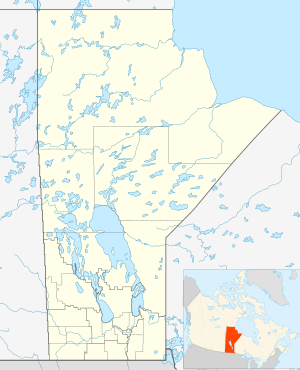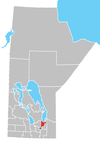Rural Municipality of West St. Paul
West St. Paul is a rural municipality in Manitoba, Canada. It lies adjacent to the north side of Winnipeg, and directly west of the Red River. It is part of the Winnipeg Capital Region, and had a population of 5,368 at the 2016 census.
West St. Paul | |
|---|---|
Rural Municipality | |
 RM of West St. Paul Municipal Hall | |
 West St. Paul | |
| Coordinates: 50°00′43″N 97°06′54″W | |
| Country | |
| Province | |
| Region | Winnipeg Metro Region |
| Founded | 1888 |
| Established | 1915 |
| Government | |
| • Mayor | Cheryl Christian |
| • MLA | Shannon Martin |
| • MP | Raquel Dancho |
| Area | |
| • Rural Municipality | 87.81 km2 (33.90 sq mi) |
| • Metro | 5,306.79 km2 (2,048.96 sq mi) |
| Elevation | 229 m (751 ft) |
| Population (2016)[1] | |
| • Rural Municipality | 5,368 |
| • Density | 61/km2 (160/sq mi) |
| • Metro | 778,489 |
| Time zone | UTC−6 (CST) |
| • Summer (DST) | UTC−5 (CDT) |
| Forward Sortation Area | R4A |
| Area codes | Area codes 204 and 431 |
| Website | weststpaul |
It contains two communities, Middlechurch and Rivercrest. Middlechurch is the larger of the two communities and includes the municipal hall, cemetery, curling club, fire station, St. Paul's church, the Middlechurch Home of Winnipeg, and Grassmere Creek and lies at the Southern portion of the municipality.
The community of Rivercrest lies to the North and contains the West St. Paul School and Royal Manitoba Yacht Club.
History
West St. Paul was formed on 3 November 1915 when the municipality of St. Paul (1888-1914) was subdivided into West St. Paul and East St. Paul.[3]
Municipal Hall
The two story municipal Hall was built in 1917 and expanded with a North and South addition in 1989.[4] It is considered a municipally designated historic landmark of Manitoba and currently the only official historic site within West St. Paul.[4]
Water
Water services are provided by the Cartier Regional Water Co-Op via the Headingley Water Treatment Plant. From there the CentrePort distribution line serves Rosser Reservoir, the R.M.of Rosser and the CentrePort development. Further northeast is the West St. Paul Reservoir which serves the R.M.[5]
Fire Department
The West St. Paul Fire Dept. is not a full-time fire department, but rather a paid-on-call department, meaning firefighters are paid only for the emergency calls and training that they attend. The department's fire coverage area encompasses the entire municipality of West St. Paul or 87.66 km2 (33.85 sq mi). The department responds to a variety of emergency situations including but not limited to fire response, medical response, motor vehicle collisions, Carbon Monoxide alarms, downed power lines and water rescue response. The department responded to a total of 264 calls for service in 2013.
The West St. Paul Fire Department's current organizational structure consists of 1 Fire Chief, 1 Deputy Fire Chief, 3 Captains, 2 Lieutenants, 1 training officer and 18 firefighters. The department has 26 total members.
The department currently has 6 vehicles and 1 boat it uses to respond to calls for service including 2 pumper engines, 2 water tankers, 1 rescue/command truck, 1 squad and 1 zodiac boat for water rescue response.
Curling Club
The West St. Paul curling club was built and has been in operation since 1963. It received some notoriety in 2015, when team Reid Carruthers, from the West St. Paul club, won the Men's Manitoba Curling Provincials and placed third in the Men's National Brier [6][7]
St. Paul’s Anglican Church
Established in January 1825, St. Paul's Anglican church was built in order to keep up with the growing population along the Red River.[8] The structure of the church was rebuilt in 1844 and again in 1878 as result of damage due to flooding. The Historic Sites Advisory Board of Manitoba erected a plaque in 1975 owing to its historical importance, however it is not yet listed as a historic site in Manitoba. Prior to becoming a municipality, the region surrounding the church was known as the parish of St. Paul's or parish of the middle church (middle owing to its being situated between the older St. John's Cathedral ("upper church") and St. Andrews-on-the-Red ("lower church"). Thus the church and parish provided a name to both the municipality as well as the nearby community.
West St. Paul School
West St. Paul has one school is a kindergarten to grade 8 school that was built in 1947, expanded in 1953 and expanded again in 1959.[4] Prior to building the school, classes were held at a local church (K to 3) as well as the municipal hall (grades 4 and up). In 1959, it joined the newly formed Seven Oaks School Division. Its current capacity is 600 students.[4]
References
- "2016 Census Profile - West St. Paul". statcan.gc.ca. Ottawa: Statistics Canada. November 29, 2017. Retrieved December 25, 2019.
- "Elevation at RM of West St. Paul". earthtools.org. Retrieved December 25, 2019.
- "Manitoba Municipalities: St. Paul". Manitoba Historical Society: Historic Places in Manitoba. Manitoba Historical Society. Retrieved 16 October 2015.
- "West St. Paul Municipal Hall". Canada's Historic Places: A Federal, Provincial, and Territorial Collaboration. Parks Canada. Retrieved 16 October 2015.
- "Cartier Regional Water Co-op: Public Water System: Annual Report 2018" (PDF). crwc.ca. March 28, 2019. pp. 3–4, 7–8. Retrieved February 11, 2020.
- Saelhof, Todd (March 4, 2015). "Team Manitoba third Braeden Moskowy used to curling success in Calgary". Calgary Sun. Retrieved 16 October 2015.
- Wiecek, Paul (September 2, 2015). "Manitoba's new kings of the rings: Carruthers' upset win another demoralizing blow to McEwen". Winnipeg Free Press. Retrieved 16 October 2015.
- "Historic Sites of Manitoba: St. Paul's Anglican Church and Cemetery". Manitoba Historical Society: Historic Places in Manitoba. Manitoba Historical Society. Retrieved 16 October 2015.
External links
| Wikimedia Commons has media related to Rural Municipality of West St. Paul. |
